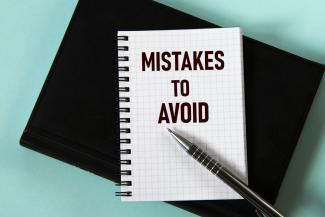
Estate Planning Mistakes You Should Avoid
Estate Planning Mistakes You Should Avoid
Estate planning can bring peace of mind by ensuring that your possessions, interests, and loved ones are safeguarded after your death, but it can also be a breeding ground for costly errors. While making an estate plan is necessary, making one that avoids common problems and errors is critical! After all, you don't want to spend all that effort developing a strategy to safeguard your loved ones only to have it plagued with faults that cause them stress and anxiety.
Fortunately, many of these mistakes are easily avoided if you know how to prevent them. This article explains how to avoid the most typical estate planning blunders.
Whether making your first plan or modifying an old one, learn what can go wrong to write a faultless strategy that accomplishes exactly what you want while protecting your legacy.
Not preparing for disability.
We make wills and trusts mostly because we know we will die eventually. We want our heirs to understand how to divide our property and other assets. But what if we are rendered incapacitated?
It is easy to overlook that circumstances other than death can take away our decision-making ability. These types of situations should also be addressed in a well-thought-out estate strategy. It should list the people who are allowed to make essential choices on your behalf, such as financial, health care, and other critical affairs. Make a list of decision-makers, explain your preferences to them, and execute any appropriate powers of attorney.
Failure to plan for it
The most common mistake people make regarding estate planning is not making the time to do it. Unfortunately, far too many of us put it off, but failing to prioritize or assure the completion of your estate plan may ultimately jeopardize the financial future of your estate and your legacy.
, and, most crucially, your loved ones.
Wills and forms that are no longer in use
Suppose you wrote a will 20 years ago and haven't touched it since it's likely outdated. Estate plans are not a "set it and forget it" solution.
We recommend that our customers examine their estate planning agreements and beneficiary forms every couple of years and always following a change in family status, such as a birth, death, divorce, or marriage – even if you move out of state. It is best practice to update your will every five years and your health care and financial powers of attorney every three years.
Deciding for Only One Designate Beneficiary
For any of your assets, you should always name more than one beneficiary. If a beneficiary dies before you, you should establish a contingent beneficiary. This person would be the next in line to inherit your estate or any specific asset. You should specify more than one contingent beneficiary.
Not Making Plans for Nursing Home Care
Some people should include pre-planning for nursing home care in their retirement plans. Many patients who require nursing home care will use Medicare funds, but only after they have exhausted all other options. This frequently causes financial hardship for the spouse who remains at home.
In your estate plan, planning for nursing home care allows you to direct your financial decisions for several years.
Neglect About Your Digital Assets
Digital Estate Planning is new, yet it makes sense in today's modern society. Include a Digital Estate Plan specifying how you want all your digital assets handled after your death. Social media accounts, online banking, email addresses, and other services may fall under this category.
Using life insurance to trigger the estate tax
Wealthy people who die while still owning their life insurance policy may unwittingly generate a taxable event for their descendants. While life insurance death payments are not subject to federal or state income taxes, the funds may be liable to estate tax if the insured had any "incidents of ownership" at the time of death.
Choosing the Wrong Executor for Your Estate
It is often difficult to choose who would be the ideal executor for your estate, trustee for a trust fund, or guardian for young children. While a surviving spouse may appear to be the logical choice, what if they lack the necessary knowledge of money, investments, or tax rules to administer a trust or significant estate?
Sometimes, a spouse or child is not a good fiduciary because they disagree with your judgments. You may be apprehensive that they will not carry out your will as your executor. They could be squanderers who cannot be trusted to perform appropriately as trustees or guardians.
Putting together an estate plan is one of the most selfless things you can do for your family and loved ones. But don't let your good intentions die because you make one of these inadvertent Estate Planning errors. Do you need assistance with your estate planning? Please do not hesitate to contact us.
